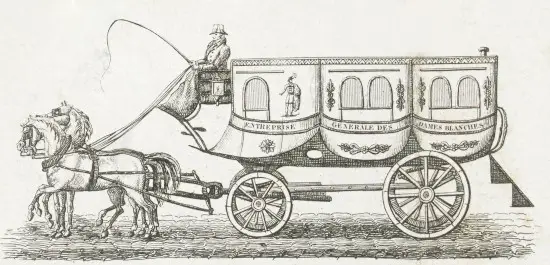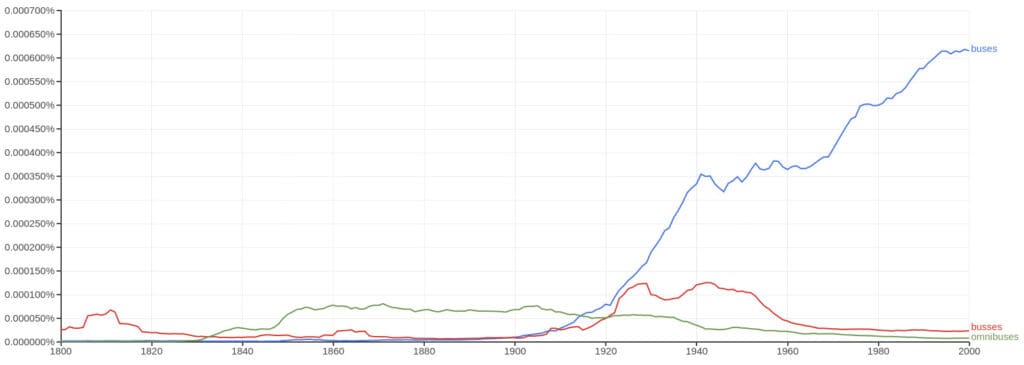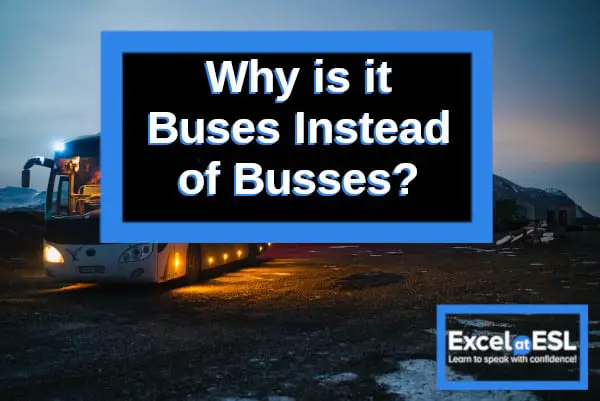Sometimes it can feel like English is a confusing mess. The English language is massive. The Oxford English dictionary pegs English vocabulary at over 600,000 words! English is prolific for its ability to absorb foreign vocabulary and change and adapt. Modern English is almost unrecognizable from the English of old.
That means English has many exceptions to its various rules for grammar, and especially for spelling. You may believe that a word in English should be spelt one way, but you come to find out that it is actually something different! What a pain! However, the story behind why often gives us enough of an interesting tale to almost forgive English for its infuriating spelling.
The plural for the word “bus” is one of these stories.
The plural for bus is buses. The confusion between buses and busses likely comes from situations where English words double their final consonant. English nouns don’t do this. It happens most often for English verbs. Busses was once acceptable as a plural for bus, but it has since fallen out of use.
Consonant Doubling in English
Before we get into the history of this word’s plural form, it’s important we talk about the situations where English words regularly double their final consonants.
You have likely seen situations where the final letter of a word is doubled before you add the ending. This happens in English verbs when adding the endings -ing or -ed:
- rob – robbing – robbed
- quiz – quizzing – quizzed
- rap – rapping – rapped
- dip – dipping – dipped
- tan – tanning – tanned
If you’re paying attention, you’ll notice that each of those words is a single syllable. Consonant doubling happens in single syllable words with a single vowel before the single ending consonant.
Therefore, it does not happen in the following situations:
Words with two vowels
- read – reading – read
- loot – looting – looted
- creep – creeping – creeped
- soap – soaping – soaped
- hail – hailing – hailed
Words ending in two consonant
- kill – killing – killed
- mark – marking – marked
- slurp – slurping – slurped
- stock – stocking – stocked
- stamp – stamping – stamped
Words ending in X
- box – boxing – boxed
- hex – hexing – hexed
- vex – vexing – vexed
Words ending in W or Y
- sew – sewing – sewed
- snow – snowing – snowed
- stay – staying – stayed
- play – playing – played
Sounds not spelling
You might have noticed some situations above where you think there might be exceptions to this rule, but if you pay attention to the sounds in the words, you’ll find that there are none.
Words ending in X
When a word ends in X it actually ends in two consonant sounds /k/ and /s/. The single letter X is pronounced with two consonant sounds together as /ks/.
Since you do not double a word with two consonants, you do not double words that end in X.
Words ending in W or Y
There is a similar idea with words that end in W or Y. These two letters are treated as vowel sounds within words they appear in. W is the vowel sound /ʊ/ and Y is the vowel sound /ɪ/.
Since you do not double a word that ends with a vowel, you do not double words that end in W or Y.
What about words that start with QU?
You may think that these words are an exception to the doubling because they frequently are spelt with two vowels in the middle of them (quiz or quit). However, the cluster QU is pronounced with the consonant sounds /k/ and /w/. You don’t speak a vowel sound while pronouncing this cluster.
So these kinds of words fit our original pattern of single syllable words with a single vowel before the single ending consonant.
Okay but what about bus?
This brings us to the word bus. Since this word is a noun, it doesn’t experience consonant doubling in the plural. This follows almost every other English noun.
- kid – kids
- light – lights
- map – maps
- bit – bits
- nap – naps
Where does the confusion come from?
Bus is a relatively new English word. The idea of public transportation wasn’t invented until the mid-19th century. It was around this time that the ancestor to the modern word “bus” was invented too.
Believe it or not, bus is not the original term people used to talk about this form of public transportation. Originally, the term people used was omnibus. This is a term that was borrowed into English from Latin. It means “for all”.
The name comes from one of the first bus routes in the world. It was set up by Stanilas Baudry and he ran a bus route between the city center of Nantes (a city in France) and the suburbs where his spa business was located. This bus route stopped in front of a hat shop called “Omnes Omnibus” owned by a man named Omnés. Eventually, the buses themselves came to be known as omnibuses.

For a long time, this type of transportation was known as an omnibus. It wasn’t until around the early 20th century that this word was clipped and people began to call it merely a bus. At the same time, a war broke out between the potential plural forms for this new clipped word. Around 1918, both of the plural forms buses and busses began to appear in print. For a time, these two forms existed alongside one another as alternative spellings for the plural form of bus.
In fact, Merriam-Webster dictionary says that they recommended the form busses as the preferred plural form until 1961. However, if we look deeper into the actual usage, we can find that busses was never the preferred plural form for the majority of speakers.
Below is a graph of word usage (buses, busses, omnibuses) from all English language publications in Google’s book repository published between 1800 and 2000. We can see that the plural form buses dominated all forms of print since shortly after the introduction of the clipped word bus in the early 1900s.

Click here for a larger version of the graph above.
We can see that even in the 1960s the form buses was over 3 and a half times more likely to be used over the form busses. In fact, the latter term was on a downward trend beginning in the 1950s.
One of these things is not like the other
The original confusion for the plural form likely stems from comparison to other words which resemble buses.
The plural forms for the words “fuse” and “abuse” both resemble the plural form for the word “bus”.
- fuse – fuses
- abuse – abuses
However, neither of these words are pronounced similarly to buses. So in order to differentiate these words, writers likely created the form “busses”.
But as we have seen, this would not make any sense. No other nouns in English experience a doubling of their final consonants when they are made plural. In addition, the structure of the word bus is unlike those of fuse and abuse. The plural form for those words is formed by attaching -s to the end, however the plural form for bus is formed by attaching -es to its end.
This is the same as all other words with similar structures to bus.
- bus – buses
- loss – losses
- crush (an innocent attraction to someone) – crushes
- cross – crosses
Fuses and abuses look similar to buses but their structures are not similar at all, so comparing them is like comparing apples and oranges.
Therefore, it’s safe to say that the plural form for bus is not and was never busses, despite the recommendations of Merriam-Webster up until 1961.
Buss
Further confusing the matter is the existence of the word “buss”. This is an archaic synonym for the word “kiss”.
The origins of this word aren’t known. However, it could have come into English from Latin. The Latin word for “kiss” is basium. Other possible origins are the Arabic and Persian words for “kiss” which both sound similar to buss.
The plural for buss is, of course, busses. This word isn’t used in English any longer. In fact, I had no idea that it even existed until I started research for this article and I have never seen it written in print.
to bus
Confusingly, you would normally double the consonant at the end of the verb “to bus”. This is because of the discussion we had above about doubling consonants in single syllable verbs.
The verb “bus” is a single syllable verb with a single vowel before a single consonant. Therefore, the -ing and -ed forms for this verb would be:
- bus – bussing – bussed
However, due to the plural form of the noun, the verb is also seen without any doubling at all.
- bus – busing – bused
In this situation, you can write these forms either way. If you want to follow the rule for forming them you can double up the consonant. Otherwise, you can keep the form similar to the noun plural form.
Conclusion
And so, the proper plural form for bus is buses. This was a very in-depth look at this word’s plural form. The word “bus” has a surprisingly long and complicated history that you wouldn’t know about without looking for it.
There are similar examples of interesting stories hidden in plain sight in the English language. I’ve written about quite a few already. You can read about those here.



